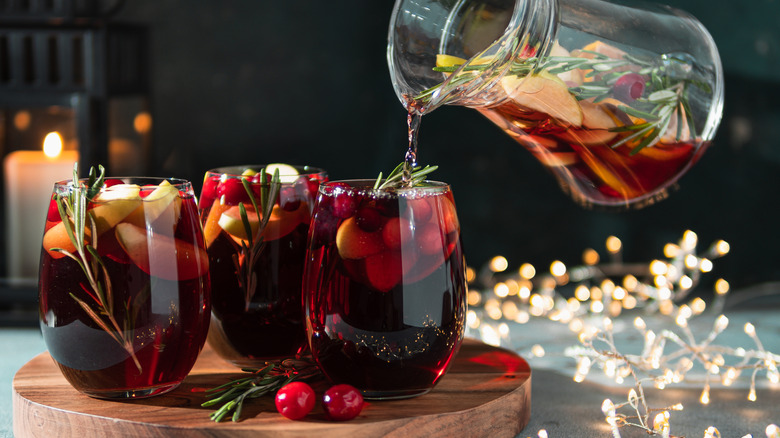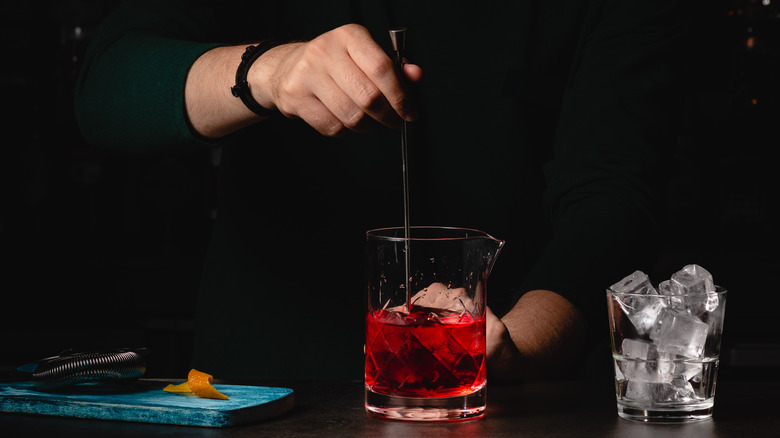The Biggest Mistake People Make With Batch Cocktails, According To An Expert
When done right, pre-batched cocktails can be the life of the party, without sucking the life out of the host by forcing them to mix individual drinks all night. However, you can't batch just any recipe and expect great results. Choose poorly, and your guests might not want a second glass, and that big pitcher of alcohol will go to waste. To learn about the best candidates for batch cocktails versus recipes you should avoid, Food Republic spoke to Chris Blatner, Executive Bourbon Steward and creator of @urbanbourbonist on Instagram.
According to Blatner, the biggest mistake regarding batch cocktails is using perishable ingredients like citrus juice. This can be tough, as tons of easy cocktails rely on a burst of citrus, such as the daiquiri, Tom Collins, and gimlet. As much as you may love these drinks, they won't be worth sipping after sitting around. Fresh-squeezed lemon or lime juice doesn't last long in the fridge – it remains safe to use for 24 hours after squeezing, but deteriorates in flavor after just six hours. Your drinks will go straight from "delicious" to "blah."
Blatner also cautions against using dairy, eggs, or carbonated ingredients in batch cocktails. Animal products can change in texture or turn rancid, while sodas and tonic water lose their fizz fast. This means no whiskey sours, espresso martinis, or gin and tonics. Are you starting to feel pretty limited? Luckily, Blatner also has ideas for cocktails that you can batch to great effect.
What cocktails are great for batching?
Chris Blatner — bourbon superfan that he is — leans on whiskey-forward classics when batching beverages for a party. "It might be basic to say[,] but my two favorite cocktails to batch, which also happen to be two of the simplest to make, are an Old Fashioned and a Manhattan," he says.
In general, stirred cocktails — meaning drinks that don't have to be shaken — are your best options. A Manhattan (whiskey, bitters, and sweet vermouth) or an Old Fashioned (whiskey or bourbon, sugar, and bitters) only need a quick stir to combine the ingredients, none of which are perishable. Look to drinks that rely on spirits, liqueurs, wines like vermouth, aperitifs, digestifs, bitters, and syrups. With these more stable components, you don't have to worry about your drink deteriorating during a stay in the fridge or over the course of a party.
More drinks that fit the bill include classic dry gin martinis, which use gin, vermouth, and maybe a dash of bitters. Sangria or punch is also a classic choice, though you'll want to add any citrus or sparkling ingredients right before serving. Any big batch cocktail can be gussied up with garnishes or other ingredients once it's time to set the pitcher out — you'll just have to spare a wee bit of extra time.
Forgetting the water is another batch cocktail mistake
When batching drinks, including water is just vital as paying attention to the booze you use. You might be wary about watering down your beverage, but dilution via water is a key element of countless cocktail recipes — it just usually comes in the form of ice. Consider the Negroni: Gin, Campari, and sweet vermouth are stirred with ice and then strained into an ice-filled glass. As the cocktail is stirred and sipped, the ice melts and adds an essential bit of dilution and balance. Without it, your Negroni would be harshly alcoholic, too sweet, and overly bitter.
Of course, stirring individual cocktails with ice to dilute them defeats the purpose of batching a drink. To get a similar effect in a bigger batch, all you have to do is add some water to the mix. How much water you should add to batch cocktails depends on how you prefer your drinks to taste. Adding water in the amount of one-fifth to one-quarter of the total volume of the drink is a good place to start.
To figure out the right flavor balance, mix individual serving of the drink with water and taste them, then scale up the recipe according to your preferences. The drink will already will be diluted to the right degree with no stirring required, so all you have to do is pour it over ice when it's time to serve.



